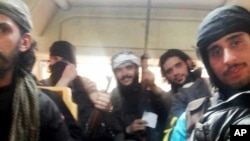Jordan, where the U.S. Central Intelligence Agency has been covertly training Syrian rebels for more than a year, is reluctant to host an expanded rebel instruction program, U.S. officials said.
Jordan's reticence, confirmed by four U.S. officials, is a potentially serious setback for President Barack Obama's proposed $500 million initiative, announced in June, to train and arm moderate rebels fighting the government of Syrian President Bashar al-Assad and al Qaida-linked groups.
It could signal a larger challenge in finding suitable nations willing to host the U.S.-led training at a time of heightened tensions across much of the Middle East.
While U.S. officials have not made a formal request to the Jordanian government, the country was widely considered a top choice to host the training due its close security relationship with Washington, proximity to neighboring Syria and pool of more than 600,000 Syrian refugees.
U.S. officials and analysts said Jordan fears violent retaliation from Syria if its territory is used for overt training conducted by U.S. military units.
"Jordan told the U.S., 'No boots on the ground'," said one of the officials, who all requested anonymity because they were discussing sensitive U.S. military arrangements.
Other current and former U.S. officials described the Jordanian position as less ironclad, however, and said they still hoped to convince Jordan to participate in the program, which must still be approved by the U.S. Congress.
The Jordanian government, through its Washington embassy, declined requests by Reuters for comment. A Jordanian official in Amman, speaking on condition of anonymity, said it was "premature to even suggest the Kingdom has rejected any such plan that even the Americans have yet to flesh out."
If not Jordan, then where?
While there are other potential sites where the training could take place, including Turkey and Gulf states such as Saudi Arabia, no agreements have been struck, U.S. officials said. Turkey and the Saudis also have sensitivities about the presence of large numbers of U.S. troops.
"There's been no decision on location, at all. Or even ... what the character of the program itself would look like, if we get the money" from Congress, said a second U.S. official.
Jordan already hosts a small and ostensibly covert effort by the CIA to equip and train small groups of Assad's opponents.
But it faces increasing threats to its stability from the Syrian civil war and rise of extremist groups such as the Islamic State of Iraq and the Levant (
Jordan's King Abdullah met with U.S. Vice President Joe Biden in Washington on Thursday for talks that included Syria, the White House said in a statement. U.S. and Jordanian officials declined to give further details.
If approved by lawmakers, the $500 million fund to arm and train rebels will not be available until Oct. 1 at the earliest, or possibly months later depending on potential delays in the U.S. Senate and House of Representatives.
Other important details, including how "moderate" rebels would be vetted to weed out those with records of human rights abuses or ties to extremist groups, have yet to be finalized, the U.S. officials said.
U.S. law requires the State Department to screen foreign military members and units being trained with U.S. funds. Assistance is barred when credible evidence of human rights abuses turns up. But it is unclear how the law applies to a proxy force like the Syrian rebels.
"I'm not seeing any evidence, as of yet, that there's any sense of operational urgency here," said Fred Hof, a former State Department official involved in formulating Syria policy before he joined the Atlantic Council think tank in 2012.
Rather than asking Congress for new funds for the fiscal year from Oct. 1, Obama could have requested urgent money from the Pentagon to get the effort started quickly, Hof said.
Pentagon officials said the military's U.S. Central Command drew up plans for a training program some time ago in anticipation of a White House request, and efforts had begun to flesh out the details.





